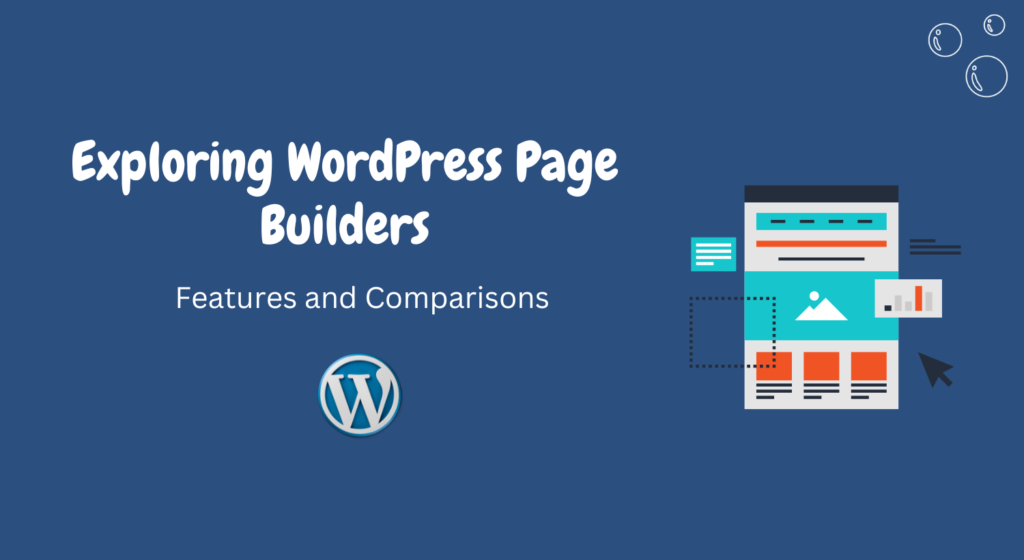In today’s digital age, having a captivating and user-friendly website is essential for businesses and individuals alike.
WordPress has long been a popular platform for website creation, and one of its standout features is the wide array of page builders available.
Page builders are tools that empower users to design and customize web pages without the need for coding skills.
In this article, we will delve into the world of WordPress page builders, exploring their features and making comparisons to help you choose the right one for your needs.
What Are WordPress Page Builders?
Before we dive into the specifics, let’s establish a clear understanding of what WordPress page builders are.
Essentially, they are plugins or integrated features within the WordPress platform that enable users to construct web pages by dragging and dropping elements.
This eliminates the need to write code manually, making web design accessible to individuals of all technical backgrounds.
Key Features of WordPress Page Builders
Now that we have a basic grasp of page builders let’s explore their features in greater detail.
These features play a crucial role in differentiating one-page builder from another.
1. Drag-and-Drop Interface
The hallmark feature of any WordPress page builder is its drag-and-drop interface.
Users can easily add elements like text, images, buttons, and more by dragging them onto the page canvas.
This intuitive process simplifies web design tremendously.
2. Pre-designed Templates
Most page builders come with a library of pre-designed templates.
These templates serve as a starting point, saving users time and effort. You can select a template that aligns with your website’s theme and then customize it to your liking.
3. Customization Options
WordPress page builders offer extensive customization options.
You can modify fonts, colors, layouts, and more to match your brand identity.
This flexibility ensures your website looks unique and reflects your style.
4. Responsive Design
In today’s mobile-centric world, responsive design is crucial.
Page builders typically include features that allow you to preview and optimize your site for various screen sizes, ensuring a seamless user experience.
5. Add-ons and Integrations
Many page builders offer add-ons and integrations with other plugins or tools.
This can enhance your site’s functionality, enabling features like contact forms, e-commerce capabilities, and SEO optimization.
6. SEO-Friendly
Search engine optimization (SEO) is vital for driving organic traffic to your website.
Some page builders come with built-in SEO tools or integrate seamlessly with popular SEO plugins, helping you improve your site’s search engine ranking.
7. User Support and Community
A strong user community and available support can be a game-changer.
Look for page builders that offer comprehensive documentation, tutorials, and active user forums.
This ensures you can easily find answers to your questions and troubleshoot issues.
Popular WordPress Page Builders: A Comparison
With a plethora of page builders available, it’s essential to make an informed choice.
Let’s compare some of the most popular WordPress page builders to help you decide which one suits your needs best.
1. Elementor
Elementor is renowned for its speed and ease of use.
It offers a vast library of templates and widgets, making it an excellent choice for both beginners and experienced users.
The free version is feature-rich, while the pro version unlocks even more possibilities.
2. Beaver Builder
Beaver Builder is known for its clean code output, which contributes to faster loading times.
It has a user-friendly interface and focuses on simplicity. Beaver Builder is particularly suited for agencies and freelancers.
3. Divi Builder
Divi Builder is part of the Divi theme and is highly versatile.
It offers a real-time visual editor and a vast range of design options. Its comprehensive theme builder feature allows you to create custom headers, footers, and more.
4. WPBakery Page Builder
Formerly known as Visual Composer, WPBakery Page Builder is a popular choice for its extensive compatibility with other plugins and themes.
It’s ideal for those looking to create complex layouts.
5. SiteOrigin Page Builder
SiteOrigin Page Builder is a free option with a straightforward interface.
It excels in creating grid-based layouts and is particularly suited for bloggers and small business owners.
Conclusion
Selecting the right WordPress page builder is a crucial decision for anyone looking to create an impressive website without the hassle of coding.
Each of the page builders mentioned above has its unique strengths, so it’s essential to assess your specific requirements and preferences before making a choice.
Remember that the ultimate goal is to create a website that not only looks appealing but also functions seamlessly. Whether you prioritize ease of use, design flexibility, or advanced features, there’s a WordPress page builder out there to meet your needs.
If you’re ready to take your website to the next level, explore these page builders, and unlock the potential of WordPress web design.
FAQs (Frequently Asked Questions)
- What is a WordPress page builder?
- A WordPress page builder is a tool or plugin that allows users to create web pages using a drag-and-drop interface, eliminating the need for manual coding.
- Are WordPress page builders suitable for beginners?
- Yes, many WordPress page builders are beginner-friendly and offer pre-designed templates to simplify the website creation process.
- Which WordPress page builder is the best for e-commerce websites?
- Page builders like Elementor and Divi Builder are excellent choices for e-commerce websites due to their extensive customization options.
- Do page builders affect website speed?
- The impact on website speed varies among page builders. Some are optimized for speed, while others may require additional performance optimization.
- Can I switch between page builders if I change my mind?
- Switching between page builders can be challenging and may require some manual adjustments. It’s essential to choose the right one from the start to avoid complications later.


